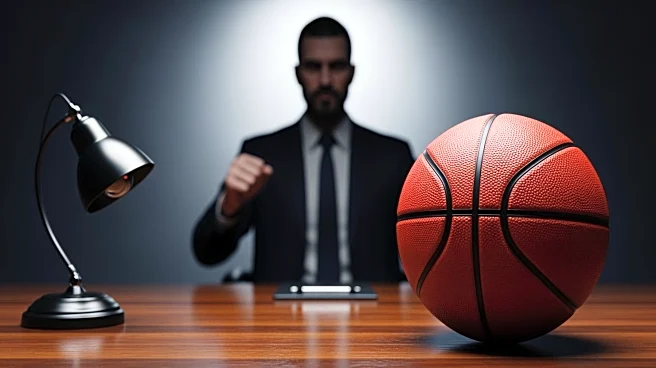What's Happening?
The Dallas Mavericks have fired their General Manager, Nico Harrison, following a courtside conversation between Mavericks owner Patrick Dumont and a fan. The fan, Nicholas Dickinson, who is a lifelong Mavericks supporter, had previously flipped off Dumont at a game
and was advised by his father to apologize. During the apology, Dickinson wore a Lakers jersey in protest of a trade made by Harrison. The conversation reportedly started casually but turned to the trade, with Dumont allegedly admitting it was a mistake. Hours after this interaction, Harrison was dismissed from his position, raising questions about the influence of the fan's conversation on the decision.
Why It's Important?
This incident highlights the potential impact of fan interactions on team management decisions in professional sports. The firing of Nico Harrison, who was responsible for the controversial trade, suggests that team owners may be influenced by public sentiment and direct feedback from fans. This development could affect the Mavericks' strategy and operations, as they may seek to align more closely with fan expectations. It also underscores the importance of transparency and communication between team management and its supporters, potentially setting a precedent for other sports franchises.
What's Next?
The Mavericks will need to appoint a new General Manager to steer the team forward. This decision will be crucial in shaping the team's future strategy and addressing any fallout from the controversial trade. Fans and stakeholders will be watching closely to see how the team management responds to this incident and whether it will lead to changes in their approach to trades and team-building. The new GM will likely face pressure to make decisions that align with both the owner's vision and fan expectations.
Beyond the Headlines
This event raises questions about the role of fan influence in professional sports management. It highlights the potential for fans to impact significant decisions through direct interactions with team owners. The ethical implications of such influence could lead to discussions about the balance between fan engagement and professional decision-making in sports franchises. Additionally, it may prompt teams to reconsider how they handle public relations and fan feedback.
















